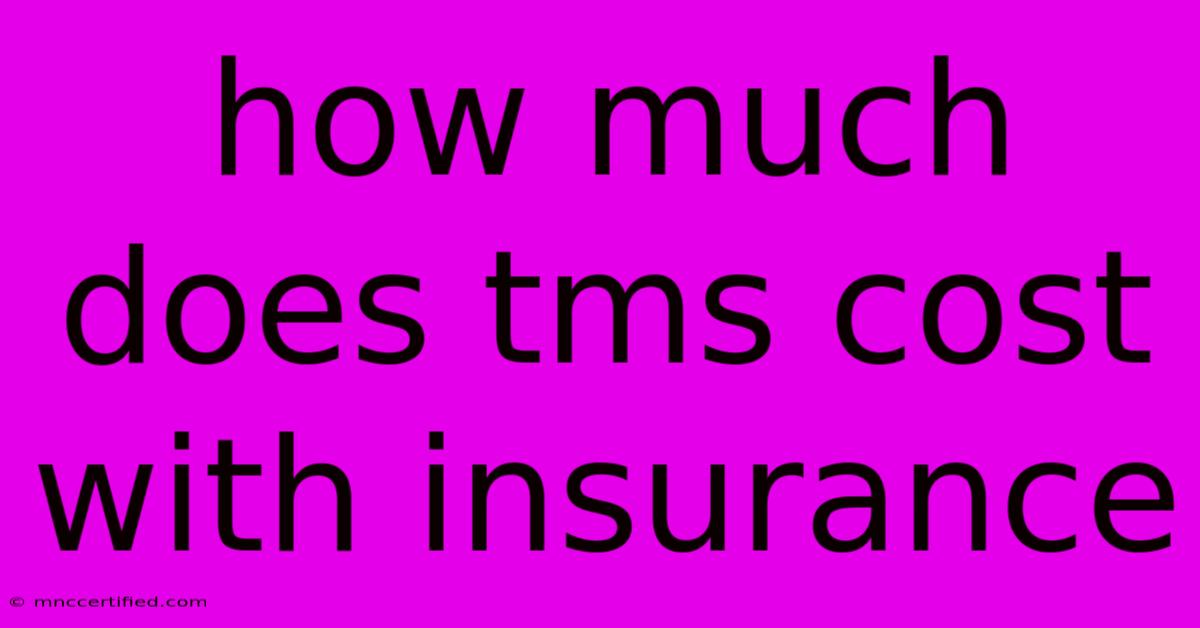How Much Does Tms Cost With Insurance

Table of Contents
How Much Does TMS Cost With Insurance? A Guide to Understanding Treatment Costs
Transcranial Magnetic Stimulation (TMS) is a non-invasive treatment option for various mental health conditions, including depression, anxiety, and obsessive-compulsive disorder (OCD). While TMS offers a promising solution for many individuals, a common question arises: how much does TMS cost with insurance?
The answer, unfortunately, isn't straightforward. The cost of TMS treatment can vary significantly depending on several factors, including:
- Your insurance plan: Different insurance plans have different levels of coverage for TMS, with some plans offering full coverage, while others may only cover a portion or require pre-authorization.
- The number of treatment sessions: TMS treatment typically involves daily sessions for several weeks, and the total cost will depend on the number of sessions needed for optimal results.
- The location of the treatment center: Costs can vary depending on the geographical location of the treatment facility and the provider's fees.
Here's a breakdown of how insurance coverage typically works:
- In-network providers: If your treatment center is in-network with your insurance plan, you'll likely pay a lower co-pay or coinsurance per session.
- Out-of-network providers: If your treatment center is out-of-network, you may have to pay a higher out-of-pocket cost, but some insurance plans may still offer partial coverage.
How to determine your out-of-pocket cost:
- Contact your insurance provider: The best way to determine your specific costs is to contact your insurance company directly. They can provide details about your coverage for TMS, including:
- Deductible: This is the amount you'll have to pay before your insurance starts covering costs.
- Co-pay: This is a fixed amount you'll pay per treatment session.
- Coinsurance: This is a percentage of the cost you'll pay after your deductible is met.
- Out-of-pocket maximum: This is the maximum amount you'll pay out of pocket for healthcare costs in a year.
- Check with the TMS center: The treatment center can also provide an estimate of the cost, including any potential discounts or financial assistance programs they offer.
Exploring Financial Assistance Options:
- HSA/FSA: If you have a Health Savings Account (HSA) or Flexible Spending Account (FSA), you can often use these funds to pay for TMS treatment.
- Patient assistance programs: Some pharmaceutical companies offer patient assistance programs for those who qualify, which may help reduce the cost of medication used in conjunction with TMS.
- Payment plans: Many treatment centers offer payment plans to make TMS treatment more affordable.
Tips for minimizing out-of-pocket costs:
- Negotiate with your provider: It's worth exploring the possibility of negotiating the cost of treatment with the TMS center.
- Explore different treatment centers: Get quotes from multiple TMS centers to compare costs.
- Ask about discounts: Inquire about any discounts or financial assistance programs offered by the treatment center or your insurance provider.
The Bottom Line:
While the cost of TMS treatment with insurance can be a significant factor to consider, it's essential to remember that this treatment can offer substantial benefits for those struggling with mental health conditions. By understanding your insurance coverage, exploring financial assistance options, and making informed decisions, you can make TMS a more accessible and affordable option.
Important Note: This article is for informational purposes only and should not be considered medical advice. It's crucial to consult with a healthcare professional to discuss your individual needs and determine the best course of treatment for you.

Thank you for visiting our website wich cover about How Much Does Tms Cost With Insurance. We hope the information provided has been useful to you. Feel free to contact us if you have any questions or need further assistance. See you next time and dont miss to bookmark.
Featured Posts
-
Syracuse Vs Boston College Live Stream Info
Nov 10, 2024
-
Kate Winslets Anti Aging Cream On Sale
Nov 10, 2024
-
Villas 10 Games Luiz Duran Mac Phee Insights
Nov 10, 2024
-
Ongoing Wildfire Scorches Prospect Park Forest
Nov 10, 2024
-
Sabrina Elbas Regret About Prince Harry
Nov 10, 2024